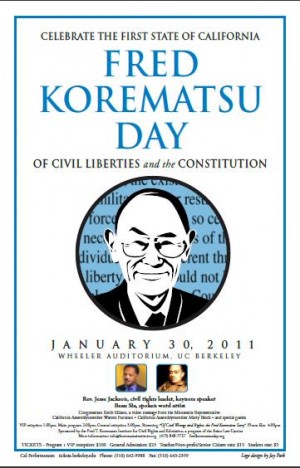In studying U.S. history, many of us recall the famous court cases that have shaped our civil rights here in America, including Plessy v. Ferguson and Brown v. Board of Education. And I’m sure you’ve heard of Rosa Parks and Dr. Martin Luther King, Jr. And surely you’ve known about Executive Order 9066 and the internment of Japanese Americans in concentration camps during World War II. But how many of you have ever heard of Korematsu v. United States?
Fred Korematsu was the lone Japanese American who challenged the legality of Japanese internment by refusing to be interned, which that decision was eventually upheld by the United States Supreme Court in 1944. Korematsu was born, raised and also lived in the San Francisco Bay Area when Pearl Harbor occurred. Korematsu evaded the authorities, but was later captured and interned. After the war was over, Korematsu was shunned by the Japanese American community.
In November of 1983, the Supreme Court decision was overturned. In 1998, Korematsu was awarded the Presidential Medal of Freedom. With the aftermath of 9/11 and the increasing racial and religious discrimination against Middle Eastern Americans and Muslim Americans, Korematsu vs. United States is a landmark case (in the bad sense) and more relevant than ever for each and every American who is concerned about their personal liberty and freedom – not just for Asian Americans.
I had not heard of Fred Korematsu until maybe a year or so ago when a friend and former colleague (and Japanese American) had sent me an article about the bill that California Assembly Members Furutani and Block were sponsoring a day of celebration and learning for Korematsu.
 This past Sunday, January 30th, 2011 in California marked the first ever Fred Korematsu Day of Civil Liberties and the Constitution – the first ever state-wide honor in the nation ever named after an Asian American. Last September, former Governor Arnold Schwarzenegger signed the bill into law. The official celebration occurred at UC Berkeley with guest keynote speaker civil rights leader Reverend Jesse Jackson amongst other notable guests, including Korematsu’s wife Kathryn and daughter Karen, California Assembly Members Warren Furutani and Marty Block (co-sponsors of the bill), and spoken word artist Beau Sia.
This past Sunday, January 30th, 2011 in California marked the first ever Fred Korematsu Day of Civil Liberties and the Constitution – the first ever state-wide honor in the nation ever named after an Asian American. Last September, former Governor Arnold Schwarzenegger signed the bill into law. The official celebration occurred at UC Berkeley with guest keynote speaker civil rights leader Reverend Jesse Jackson amongst other notable guests, including Korematsu’s wife Kathryn and daughter Karen, California Assembly Members Warren Furutani and Marty Block (co-sponsors of the bill), and spoken word artist Beau Sia.
Attendees included the original legal team who helped overturn the decision of Korematsu v. United States, as well as Mayor of San Francisco Ed Lee, Mayor of Oakland Jean Quan, SF City Supervisor Eric Mar and countless other dignitaries.
I was really interested to hear civil rights leader Reverend Jesse Jackson speak since I had never seen him in person. He discussed the various civil rights challenges of African Americans, Latinos and Asian Americans where these communities have worked separately without common cause in the past. Jackson spoke of how he learned more about Japanese internment, Fred Korematsu and even Vincent Chin, who was killed for being mistaken for a Japanese American. Ordinary Americans like Rosa Parks and Fred Korematsu can do extraordinary things. Might does not make right.
One of the things that I learned about the Fred T. Korematsu Institute for Civil Rights and Education at the event is that the Institute has developed a free K-12 curriculum for teachers in California which includes a teacher’s guide, additional lesson plans, DVDs and posters. You can learn more bout the teaching curriculum and kit here.
Also, after viewing the documentary about Fred Korematsu – Of Civil Wrongs and Rights, I have to say that I am quite impressed at the American Civil Liberties Union (ACLU) – San Francisco chapter, made the effort to aide Fred Korematsu, even when the national ACLU chapter was against it (the national leadership was friends FDR). But those in San Francisco clearly saw how wrong and un-Constitutional Executive Order 9066 was.
After the whole program was over, I have to say that I learned quite a bit more about the man Fred Korematsu, Korematsu vs. United States and how fragile one’s liberty and freedoms can quickly evaporate in times of war and heated rhetoric and that the lessons of yesterday can be very much applied to today’s uncertain times. From Guantanamo Bay to the ridiculous and racist & religious intolerance of the “Ground Zero Mosque,” all Americans need to not only learn the lessons of history, but how they apply to the present day.
You can view the whole celebration with the video links below. Videos, in order of appearance:
- Open remarks and introductions by Emcee CBS5’s Sydnie Kohara
- California Assembly Members Marty Block and Warren Furutani
- Karen Korematsu
- Of Civil Wrongs and Rights documentary trailer
- Ling Woo Liu, Director, Fred T. Korematsu Institute for Civil Rights and Education
- Fred T. Korematsu Discovery Academy student performance and student speech by Andre Alexander, freshman at the Fred T. Korematsu campus of San Leandro High School.
- Video tribute from Minnesota Congressman Keith Ellison and remarks by Stanford Law Fellow Shirin Sinnar
- Spoken word artist Beau Sia – “Legacy Living On”
- Reverend Jesse Jackson
- Excited
- Fascinated
- Amused
- Disgusted
- Sad
- Angry








